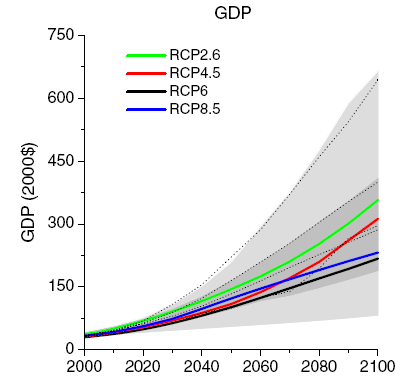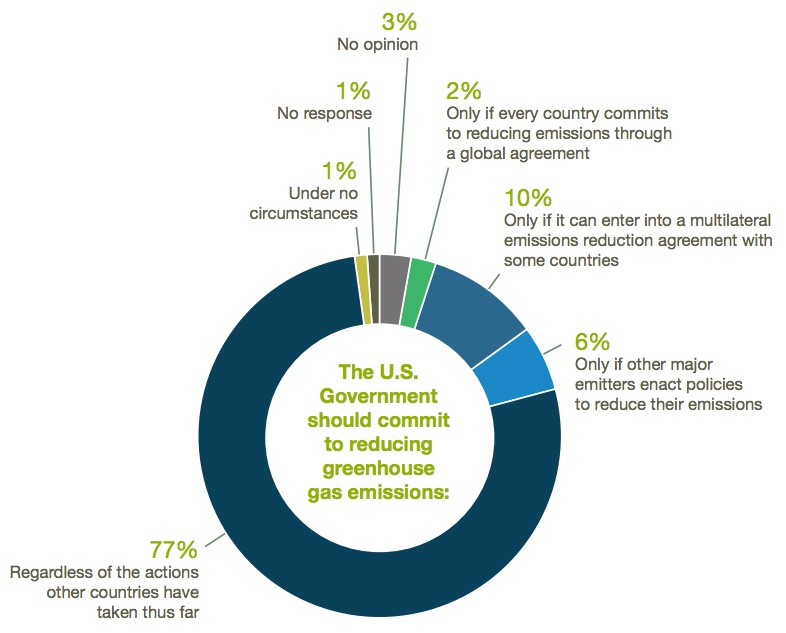The economic impacts of carbon pricing
What the science says...
| Select a level... |
 Basic
Basic
|
 Intermediate
Intermediate
|
 Advanced
Advanced
| ||||
|
The costs of inaction far outweigh the costs of mitigation. |
|||||||
Climate Myth...
CO2 limits will harm the economy
"Legally mandated measures for reducing greenhouse gas emissions are likely to have significant adverse impacts on GDP growth of developing countries [...] This in turn will have serious implications for our poverty alleviation programs." (Pradipto Ghosh)
If climate change proceeds without any efforts to reduce it, we can expect to incur serious economic costs. In fact, it's not unreasonable to expect that the effects of climate change will create greater economic instability worldwide.The solution is, of course, to reduce fossil fuel use. One way to do this is to shift away from fossil fuels towards renewable energy sources. The other way is to reduce energy demands through increased efficiency.
Both mechanisms have economic implications. In order to stimulate the private sector’s investment in renewables, governments can put a levy on fuels, which may be used to fund or subsidise new initiatives.
To reduce demand, there are a number of solutions available, but most seek to raise the cost of carbon through taxes. Such increased costs give rise to concerns that change underwritten by taxes or levies will damage economic prospects, particularly in developing countries. However, there is a consensus among economists with expertise in climate that we should put a price on carbon emissions.
2015 New York University survey results of economists with climate expertise when asked under what circumstances the USA should reduce its emissions
The Representative Picture
In the Fifth IPCC Assessment Report (AR5), a new set of scenarios called Representative Concentration Pathways (RCP) will be used. The four RCPs replace the previous scenarios from the "Special Report on Emissions Scenarios" (SRES). Each RCP represents a set of initial conditions and projections to year 2100, based on a synthesis of the peer-reviewed literature.
The graphs below show the predicted RCP trajectories for economic performance:

GDP projections of the four scenarios underlying the RCPs (van Vuuren et.al. 2011). Grey area for income indicates the 98th and 90th percentiles (light/dark grey) of the IPCC AR4 database (Hanaoka et al. 2006). The dotted lines indicate four of the SRES marker scenarios.
The number of each RCP is the forcing (in watts per square metre) associated with a specific amount of emissions for each scenario, up to the year 2100. The graph of GDP clearly shows that the pathways that reduce emissions the most in that time frame (2.6 - green, and 4.5 - red) are those with the best long-term economic performance. In other words, the investment required to reduce emissions is repaid by increased economic performance. Business as usual strategies (high-emission scenarios RCP 6 and 8.5) are the least profitable; the money saved early on is dwarfed by the costs of damage and disruption done in the longer term.
Putting a Price on Carbon
There are a number of schemes under consideration, and a number already implemented. According to the article Pollution Economics in the New York Times, more than 20 percent of global greenhouse gas emissions are now subject to carbon pricing systems. About 60 other states, provinces or countries are considering similar approaches, according to a recent World Bank report.
It’s too early to judge long-term economic performance of the early adopters, but Canada’s province of British Columbia serves as a good example of how carbon pricing can reduce fuel use - in their case through a revenue-neutral scheme. A recent study found that since 1st July 2008, when the tax was introduced:
- BC’s fuel consumption has fallen by 17.4% per capita (and fallen by 18.8% relative to the rest of Canada).
- These reductions have occurred across all the fuel types covered by the tax (not just vehicle fuel)
- BC’s GDP kept pace with the rest of Canada’s over that time
- The tax shift has enabled BC to have Canada’s lowest income tax rates (as of 2012).
- The tax shift has benefited taxpayers; cuts to income and other taxes have exceeded carbon tax revenues by $500 million from 2008-12.
Source: BC’s Carbon Tax Shift After Five Years: Results, Elgie & McClay 2013
In a separate report, the British Columbia Department of Finance found that in 2012, BC's taxes were among the lowest corporate tax rates in North America and the G7 nations.
Conclusions
There is a consensus among expert climate economists that carbon pollution limits are needed to prevent climate change from badly damaging the global economy.
A number of economic incentives are being tried with varying degrees of success. Regional schemes are already proving effective, flexible and popular. An important ingredient seems to be an accompanying tax reduction that makes the carbon tax revenue-neutral.
In the long term, unless we drastically reduce the rate at which we are still emitting greenhouse gases, we are very likely to incur huge costs as a result of climate change. Part of these costs will be in adaptation, and the inevitable disruption. In part costs will escalate due to turmoil and uncertainty throughout the economic world. There will also be costs that cannot be quantified, particularly when we try to value a human life and its loss.
We have to reduce our emissions. If we are to avoid draconian government intervention, carbon pricing schemes are a viable method of encouraging us to reduce fossil fuel use. Coupled with other measures to stimulate renewable energy development, putting a price on carbon may help us make the transition away from fossil fuels. And from our experience to date, it seems likely that carbon taxes, instead of bringing an economy to its knees, may well help transform an outdated system into one fitting for a sustainable century.
Basic Rebuttal written by GPWayne and dana1981
Last updated on 2 January 2016 by dana1981. View Archives































 Arguments
Arguments
































Seeing articles like this years later is hilarious, BCs emissions since 2013 have only increased (between 2013 and 2016 they went back up to 2008 levels). Yes their emissions per capita have decreased, but that has been decreasing since before 2008, same with fuel consumption. Also Ontario's total emissions have decreased 19 percent since 2005. Ontario never had a provincial carbon tax scheme. And since the introduction of the federal scheme, emissions per GDP in Canada have only stayed the same, maybe a marginal decrease. This is big govt nonsense not based on economic reality, BC cut income taxes, precisely because they knew the economic impact carbon taxes would have.
[PS] It would be helpful if you provide the source your data. At first glance, this does not seem to tie in well with data at https://www.canada.ca/en/environment-climate-change/services/environmental-indicators/greenhouse-gas-emissions.html
You also seem to be asserting that Ontario has no carbon pricing but same source indicates a range of emission programs.
The article also makes it clear that the carbon tax is revenue neutral - ie income tax is reduced by revenue from carbon tax.
charles125 @ 126:
The moderator has pointed out your lack of sources for data, and some inconsistencies in your brief comment. I'll point out a few more.
Your economic argument appears to make the "one cause and only one cause" error. CO2 emission are not affected only by carbon taxes - many factors come into it. For your argument (that carbon taxes had no effect on emissions) to make sense, because changes happened without them, you need to pretend that nothing else matters. To make a successful argument, you would have to show that actual emissions remained the same as they would have if there had been no carbon tax (all other factors remaining in effect). That requires a level of economic analysis that you have not provided (or given a reference to).
You also have logical inconsistencies in your short argument. At the end, you say "...they knew the economic impact carbon taxes would have." Which is it: no impact (no emission changes), or impact? You can't have it both ways.
...and you are misrepresenting the reason BC cut taxes when they introduced their carbon tax. They did so in order to make the carbon tax revenue-neutral. Their policy was to keep collecting the same total $ in taxes, but switch the means of collecting some of those dollars from income etc. to fossil fuel use. That provides an incentive to move away from fossil fuels - you only pay the carbon tax if you use fossil fuels, but everyone sees the other tax reductions (whether they use fossil fuels or not). The people that move away from fossil fuels see more money in their pockets, while the profligate fossil fuel user ends up with less in their pocket. This is exactly the sort of market-driven process that economists think is an efficient method of incentivizing innovation and individual choice in reducing fossil fuel use.
The Canadian carbon pricing scheme was also designed to be revenue-neutral. A fee was charged on fossil fuels, but taxpayers received quarterly rebates. In January, my household received $210. The rebates were set at a level so that total rebate $ were close to total carbon fee $ - but again, the family with below-average fossil fuel use still got the same rebate as everyone else, so they had more $ in their pockets. It was the high-fossil-fuel users that paid more in carbon fees than they got back. A disincentive to use fossil fuels - the invisible hand of the market at work.
Unfortunately, certain political elements beat the drum of "carbon taxes bad!". Those politicians never emphasized "we're going to axe your carbon rebates!" (many people were unaware that they even existed), and people drank the koolaid so now the political trend is to eliminate those carbon fees.
And you also show a lack of knowledge of the history of carbon pricing in Ontario. Ontario used to have a cap-and-trade system in place. Not strictly a "carbon tax", but still a cost on fossil fuel use. A change in government eliminated that program. Ontario's reductions in CO2 emissions under the previous government were also partly the result of a policy to eliminate coal-powered electricity production. More than one policy. More than one factor involved in reducing CO2 emissions.